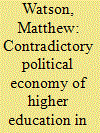| Srl | Item |
| 1 |
ID:
103538


|
|
|
|
|
| Publication |
2011.
|
| Summary/Abstract |
The Coalition government's first Comprehensive Spending Review will cut 40% from university budgets by 2014. This will result in an increasingly tension-prone political economy of UK higher education. As it is, the sector already sits uncomfortably astride the two distinct welfare models currently in existence in Britain. As the fees agenda has taken hold, university degrees have been increasingly susceptible to being rebranded as a strategic investment in the future, thus acting as an exemplar for the move towards an asset-based system of welfare. Despite this, even in the post-Browne world students will still not be charged the full market price of delivering degree programmes. Higher education institutions therefore continue to be redistributive mechanisms providing long-term welfare-enhancing transfer payments to their overwhelmingly middle-class student base. The budget cuts and the associated changes to student finance will bring into stark relief the contradictions of serving two welfare masters at once.
|
|
|
|
|
|
|
|
|
|
|
|
|
|
|
|
| 2 |
ID:
172417


|
|
|
|
|
| Summary/Abstract |
This article responds to the contemporary debates in UK higher education about the need to ‘decolonise the curriculum’, with particular attention to the implications for the discipline of history. The author positions these important debates as one outcome of a transnational movement led by students of colour whose grievances reach into and beyond the classroom. The first part of the article examines the origins of this movement identifying some important antecedents as well as the broader political and socio‐economic forces that propelled its rise in 2015. There then follows an examination of the movement's multidimensional critique of the university sector, which includes—but is not limited to—the call to ‘decolonise the curriculum', before considering potential implications for academic workers labouring in the discipline of history.
|
|
|
|
|
|
|
|
|
|
|
|
|
|
|
|
| 3 |
ID:
143752


|
|
|
|
|
| Summary/Abstract |
Over the last decade, intelligence has become one of the most widely taught subjects in higher education. In response to this, a sub-discipline has emerged within Intelligence Studies devoted to thinking about how the subject is actually taught. One of the most common arguments to come out of this literature is that there should be more practitioner involvement in the university teaching of intelligence. However, it is rarely specified what exactly intelligence professionals bring to the classroom, save the largely self-evident point that because they have ‘walked the walk’, they are uniquely qualified to teach the subject. Drawing on student questionnaires, as well as interviews with serving and retired intelligence officers, this article attempts to probe a little deeper and identify the specific benefits of incorporating practitioners into the university teaching of intelligence. It is argued that practitioners ‘put a face on the profession’ and help to remove some of the mystique and misperceptions that surround intelligence work. It is claimed that practitioners, especially with their ‘inside stories’, give added meaning to academic theories and make the subject more exciting. Finally, it is argued that practitioners enrich the broader ‘student experience’. In UK higher education, now under a new fees regime, students are looking for departments to go the extra mile not only in terms of their teaching, but also in areas like careers advice and support. In this context, intelligence professionals are enormously valuable.
|
|
|
|
|
|
|
|
|
|
|
|
|
|
|
|